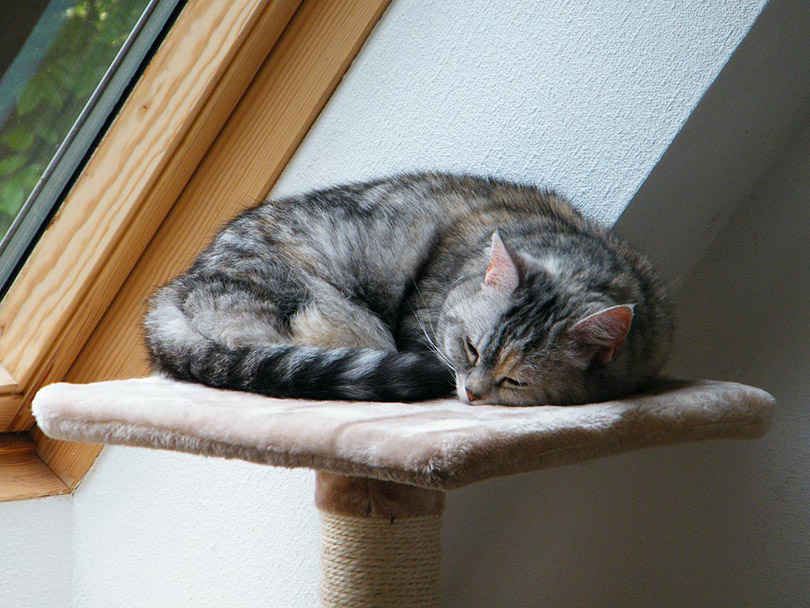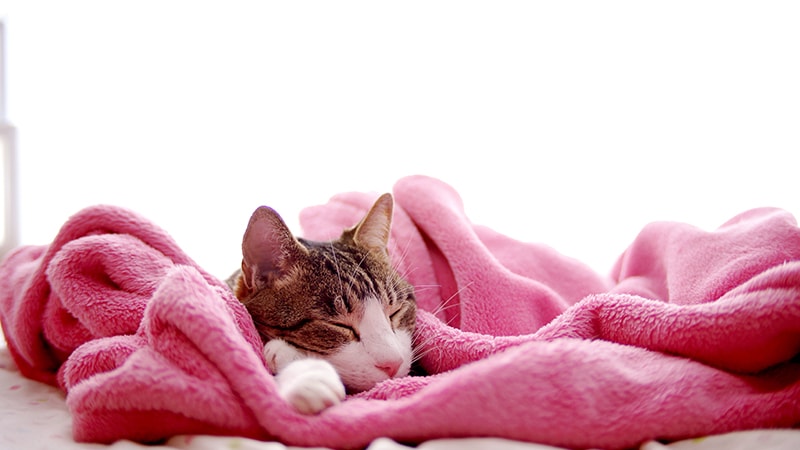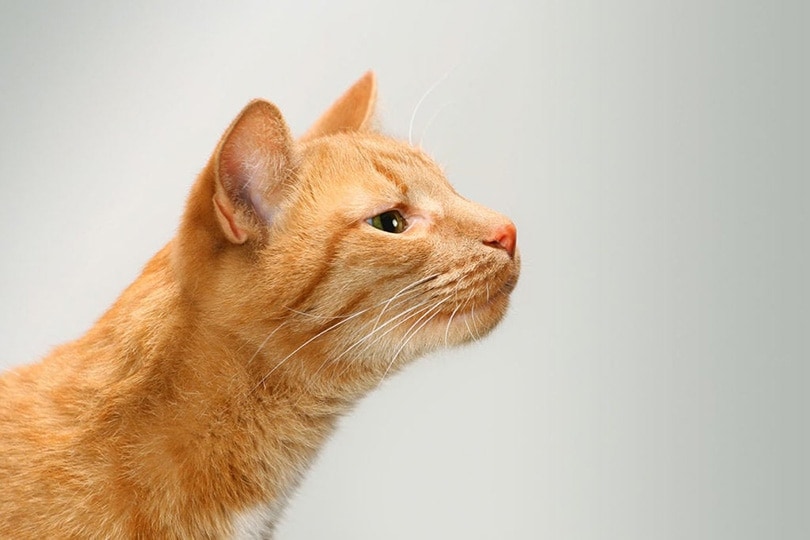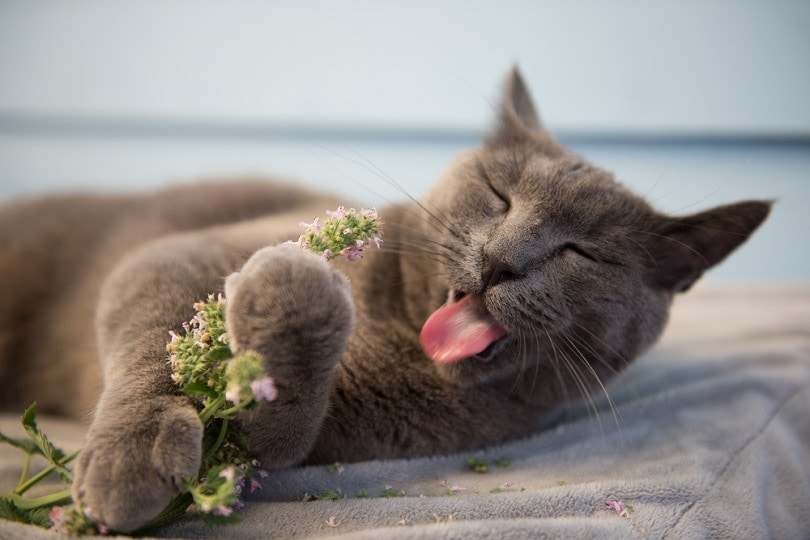My Cat Died In My House: 6 Steps That You Need to Take Next

Updated on

No matter how much time we have to prepare, we’re never completely ready, mentally or emotionally, for the passage of a family pet. Feelings, routines, and life change significantly without their influence, and the immediate impact is often confusing and stressful.
Properly tending to the body and arranging your final farewells will smoothen the transition for everyone involved and initiate the healing process. Knowing you are appropriately honoring your pet is crucial. Although these moments are always difficult, you can make it easier by understanding how to react when your cat dies in the house.
Check to Ensure Your Cat Is Deceased
Older and ill pets slow down considerably in body and mind. Rest finds its way into longer stretches of the day, and your cat’s general activity will relax.
An alive cat is typically easy to distinguish, sleeping or not. Still, there are situations where an owner may question whether their cat has passed. Although periods of deeper sleep are much shorter in cats, they enter REM cycles from which they can be more difficult to wake.
- No breathing motions in the chest and stomach
- Open eyes, indicating a lack of muscle control to keep them shut
- Dilated pupils that don’t react to changing light
- No pulse
- No reaction to loud noises
The 6 Steps That You Need to Take When Your Cat Dies in Your House
1. Lay Your Cat on a Large Blanket or Towel

After confirming your cat has died, quickly move them to a hard floor. Lay them on a towel or thick blanket over a plastic sheet. As their organs and muscles relax, recently deceased animals may expel urine or feces. It is a common occurrence unrelated to a specific underlying health issue.
Preventing a cleanup in the home or on your pet will facilitate the later steps. Alongside an absorbent towel, a rigid box for holding your cat can keep any potential biohazard from migrating.
2. Position Your Cat in a Tucked Position
Rigor mortis, the stiff contraction of the muscles, sets in within 3–4 hours after death and typically lasts for at least 12 hours. Positioning your pet in a more contained position will simplify moving them. Tuck the front and rear legs closely against the body, and wrap in a blanket if desired.
3. Let Your Other Pets Smell Your Cat

Pets must also work through the grieving process when a fellow cat dies. Letting them smell your deceased cat will help them recognize what happened, preventing the stress and confusion of not knowing when their friend goes missing. It can be as easy as letting them stay in the same room as your cat.
4. Arrange Cremation or Burial
Consider how you plan to lay your cat to rest. If you own your home, you may wish to bury them on your property, which is generally a fitting approach when you live in your forever home. However, you will first have to check the laws and regulations governing your place of residence. It’s not wise (or legal) to bury a pet at a rented home, and risks from flooding, wild animals, and numerous other factors often make other methods more sensible than a backyard burial. Most states also have a handful of pet cemeteries where you can arrange a safe and fitting funeral.
Cremation is a low-cost and safe alternative to a standard burial. The service typically only runs $100–$200. You can still bury your pet after the cremation, which will often create fewer potential environmental issues, or you can keep their memory ever-present in an urn or a piece of jewelry. Talk to your vet about local cremation options. They may offer services at their offices, but if not, they will at least be able to point you in the right direction.
5. Preserve Your Pet’s Body

Depending on when your cat died, you may have to wait several days before a cremation or pet funeral service is available. Keeping your cat’s body cool and contained will preserve them while you wait for the service. A dedicated refrigerator is ideal. If your cat is too large to fit, place them in the coldest area of the home, such as on a hard garage floor.
Wrap your cat in a few layers of plastic bags, and store them in a freezer if you have to wait several days to arrange its burial or cremation. Doing so may feel strange to some, but it is necessary to slow decomposition and prevent odors. Properly preserving your pet will make any service more comfortable and fulfilling for everyone involved.
6. Take Time for Yourself
A cat’s death can be devastating, and acknowledging your emotions and feelings will be vital in overcoming the grief of losing a loved one. Intense emotional reactions can feel misplaced or embarrassing, causing many pet parents to contain them and proceed in a business-as-usual fashion. The dissonance can lead to distress, potentially affecting your relationships and prolonging your grief.
Echoes of heartache and guilt remain long after a pet dies, and the lost connection affects many parts of daily life. Noticing and appreciating them will help you move forward.
Seek support. Find communities of cat owners who understand your circumstances and can offer validation and guidance. Talk to your doctor about your cat’s death at home and its effect on your mental and emotional state. They could provide referrals for mental health professionals to help manage the pain of the loss. Devoted pet owners understand the weight of loss, so don’t be afraid to lean on those in your network.
How Will My Other Pets React When My Cat Dies?
Animals grieve in different ways when they lose a friend. A 2016 study from Australia showed most cats and dogs stay closer to owners after losing a companion, seeking and offering more affection. Others have the opposite reaction, becoming distant or depressed. Common signs of grief include:
- Increased amounts of sleeping
- Loss of appetite
- Increased vocalization
- Visiting your deceased pet’s favorite spots
Pets may grieve for several months before their behavior returns to normal. Staying strong and controlling your outward emotions will be critical in managing the grieving period. Give your pet positive support and stimulation, but don’t rush the adjustment.
Final Thoughts
A death in the house can be one of the most stressful ways for a cat owner to lose their beloved companion. You miss the experience of a vet and the help in preparing your pet during an already difficult time. Remember that acting quickly and being unafraid to seek help from experts, loved ones, and the cat-owning community is the surest way to give your pet the respect it deserves during this challenging transition.
Featured Image Credit: IT-Fritze, Pixabay











